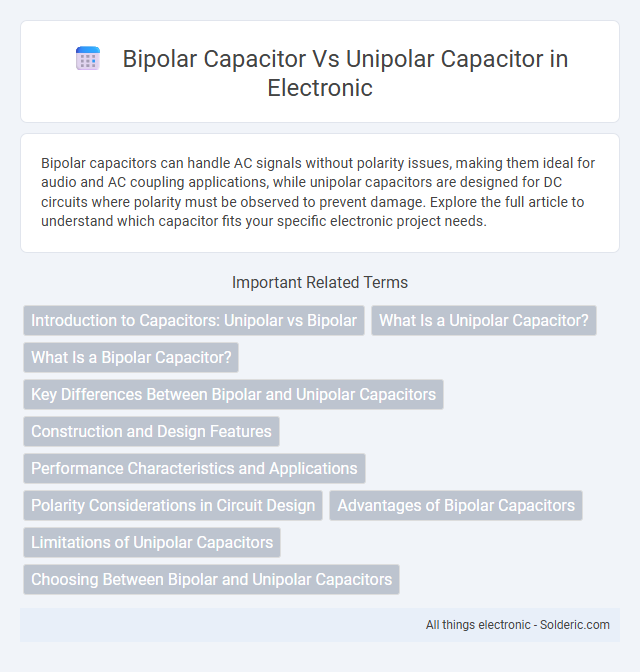Bipolar capacitors can handle AC signals without polarity issues, making them ideal for audio and AC coupling applications, while unipolar capacitors are designed for DC circuits where polarity must be observed to prevent damage. Explore the full article to understand which capacitor fits your specific electronic project needs.
Comparison Table
| Feature | Bipolar Capacitor | Unipolar Capacitor |
|---|---|---|
| Polarity | Non-polarized (works with AC and DC) | Polarized (works with DC only) |
| Usage | AC circuits, audio coupling, signal processing | DC power supply filtering, timing circuits |
| Construction | Special electrolyte or film to allow bidirectional voltage | Standard electrolytic capacitor with defined polarity |
| Voltage Rating | Usually lower voltage rating compared to unipolar | Higher voltage ratings typical |
| Capacitance Stability | Better stability in AC applications | Optimized for DC conditions |
| Price | Generally more expensive due to construction | Less expensive and widely available |
Introduction to Capacitors: Unipolar vs Bipolar
Unipolar capacitors, also known as polarized capacitors, have a fixed positive and negative terminal, making them suitable for DC circuits where voltage polarity remains constant. Bipolar capacitors are designed to handle AC signals and can tolerate voltage reversals without damage, making them ideal for applications requiring alternating current or signal coupling. Your choice between unipolar and bipolar capacitors depends on the specific circuit requirements, voltage polarity, and frequency characteristics.
What Is a Unipolar Capacitor?
A unipolar capacitor is designed to operate with voltage applied in a single direction, commonly found in applications involving DC power supplies and signal coupling where polarity must be maintained. These capacitors typically feature polar dielectric materials such as electrolytic or tantalum, making them unsuitable for AC or reverse voltage conditions. Unipolar capacitors excel in scenarios requiring high capacitance and voltage stability in one polarity, contrasting with bipolar capacitors which can handle alternating voltage without damage.
What Is a Bipolar Capacitor?
A bipolar capacitor is a type of capacitor designed to handle alternating current (AC) or signals that reverse polarity without damage. Unlike unipolar capacitors, which have a designated positive and negative terminal, bipolar capacitors are non-polarized and can be connected in either direction within a circuit. Common types include film capacitors and specially designed electrolytic capacitors that prevent degradation from voltage polarity reversal.
Key Differences Between Bipolar and Unipolar Capacitors
Bipolar capacitors are designed to handle AC signals with voltage polarity that alternates, featuring symmetrical electrodes and non-polarized construction ideal for applications involving signal coupling or filtering. Unipolar capacitors, on the other hand, are polarized with a defined positive and negative terminal, primarily used in DC circuits where voltage polarity remains constant, such as power supply smoothing. Understanding these key differences helps ensure your circuit's reliability and optimal performance by selecting the appropriate capacitor type based on voltage characteristics.
Construction and Design Features
Bipolar capacitors feature symmetrical construction with non-polarized electrodes, allowing them to handle AC signals and voltage reversals without damage, unlike unipolar capacitors that have polarized electrodes designed for DC applications. The dielectric materials in bipolar capacitors are selected to withstand bidirectional voltage stress, providing stability and reliability in AC circuits. Your choice between bipolar and unipolar capacitors depends on the circuit's polarity requirements and voltage conditions.
Performance Characteristics and Applications
Bipolar capacitors exhibit symmetrical performance with no polarity constraints, making them ideal for AC signal filtering, audio circuits, and applications requiring voltage reversals. Unipolar capacitors, designed for DC circuits, offer higher capacitance stability and lower leakage currents but require correct polarity to prevent damage, commonly used in power supply filtering and energy storage. The choice between bipolar and unipolar capacitors depends on voltage application, frequency response, and reliability needs in electronic circuits.
Polarity Considerations in Circuit Design
Bipolar capacitors can handle AC signals and reverse polarity without damage, making them ideal for circuits with varying voltage directions. Unipolar capacitors have strict polarity requirements and must be connected correctly to prevent failure, often limiting their use to DC applications. Understanding these polarity considerations ensures your circuit's reliability and optimal performance.
Advantages of Bipolar Capacitors
Bipolar capacitors offer the advantage of handling alternating current (AC) signals effectively, allowing you to use them in circuits with signal polarity that changes frequently. They exhibit greater versatility compared to unipolar capacitors, which are primarily designed for direct current (DC) applications and require specific polarity orientation. Their symmetrical construction reduces the risk of damage from reverse voltage, enhancing durability and reliability in dynamic electronic environments.
Limitations of Unipolar Capacitors
Unipolar capacitors are limited by their polarity sensitivity, which restricts their use in AC circuits or applications where voltage reverses, as incorrect polarity can cause damage or failure. These capacitors often exhibit lower reliability and shorter lifespan under varying voltage conditions compared to bipolar capacitors, which can handle bidirectional voltage stress. Your choice of capacitor should consider these limitations to avoid performance issues in applications requiring alternating current or voltage polarity reversals.
Choosing Between Bipolar and Unipolar Capacitors
Choosing between bipolar and unipolar capacitors depends on the application's voltage polarity and signal type. Bipolar capacitors handle AC signals and voltage reversals without damage, making them ideal for audio circuits and AC coupling, while unipolar capacitors are suited for DC circuits with a fixed polarity, offering better capacitance stability and longevity. Understanding your circuit's requirements ensures the appropriate capacitor is selected to maximize performance and reliability.
bipolar capacitor vs unipolar capacitor Infographic

 solderic.com
solderic.com